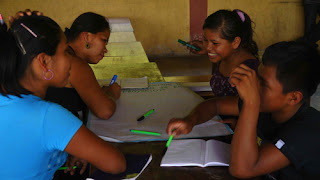Almost
half of Peru's population is indigenous, and their level of educational
participation is low. The 1532 Spanish conquest marked the beginning of Spanish
rule and devastation for the native population of Peru. The church became
landowners and established missions that imposed
cultural norms and language (Spanish) on the natives and attempted to strip them of their
culture altogether.
Shipibos

The Shipibo are a South American indigenous group in Peru. The name "Shipibo" is derived from the Shipibo word
shipi, for marmoset (Cebuella pygmaea). Hence, they have been
referred to as the "little monkey people."
The
Shipibo tribe consists of around 29,000 people living in over three hundred
villages. Census
data is unreliable due to the transient nature of the population, which travels
throughout the remote Ucayalli region and urbanized Pucallpa. The region, especially the capital port city of Pucallpa, is an important industrial
center of the Peruvian Amazon. It has one of the highest rates of deforestation in the world,
and has recently been opened up for oil extrapolation by foreign oil companies, with around 70% of the Amazon now in the hands of international oil companies. The economy of
this region is completely dependent upon the extraction of resources for
international consumption. This region is ecologically important as a
biodiversity hot spot, home to millions of endemic species, and plays an
essential role in climate and biogeochemistry systems such as water cycling and
carbon sequestering (the region is a carbon sink that moderates global
temperature and cleans the air).
The
Shipibo live in the 21st century while keeping one foot in the past. Many of their traditions are still
practiced, such as ayahuasca shamanism. Shamanistic songs have inspired
artistic tradition and decorative designs found in their clothing, pottery,
tools and textiles. Some of the urbanized people live around Pucallpa in the
Yarina Cocha, an extensive indigenous zone. Most others live in scattered
villages over a large area of jungle forest extending from Brazil to Equador.
Shipibo
women make beadwork and textiles, but are probably best known for their
pottery, decorated with maze-like red and black geometric patterns. While these
ceramics were traditionally made for use in the home, an expanding tourist
market has provided many households with extra income through the sale of pots
and other craft items.
The
Shipibo of the villiage of Pao-Yan used to have a diet of fish, yucca and
fruits. Now, however, the situation has deteriorated because of global weather
changes, leaving mostly just yucca and fish. Since there has been
drought followed by flooding, most of the mature fruit trees have died, and
some of the banana trees and plantains are struggling. Global increases in
energy and food prices have increased due to deforestation and erosion along
the Ucayali River. The basic needs of the people are more important now than
ever. There is now a sense
that hunger may not be that far off for those in the farther reaches of the
Shipibo nation.
The history of the Shipibo parallels other
indigenous groups in the Americas as far as colonial oppression,
marginalization, and impoverishment through conquest of their lands and
resources. Despite 300 years of sporadic contact with European and mestizo
"civilization," and massive conversion to Christianity in the 1950's,
the Shipibo people maintain a strong tribal identity and retain many of their
ancient shamanic traditions and beliefs.
Over
the past 50 years, many missionary groups, the government, and non-governmental
organizations have come and gone leaving a trail of unfinished or unsustainable
projects, mistrust, and divisions within communities.
Education in Peru
Even
after independence from Spain in 1825, race has continued to play a major role
in Peruvian society. As in many other Latin American nations, a three-tiered
hierarchy has emerged over time with those descended from the Spanish at the
top, the native groups at the bottom, and mixed race or mestizaje, occupying a position of some respectability in between.
Schools
are concentrated in urban areas and many indigenous communities are ignored.
They are not provided with the opportunity to learn and better their lives. Instead,
they sit and watch as their country and global corporations drain their native
lands and disrupt the natural ecosystem.
global-affiliates/peru-project
amigos/cd/rainforest_peoples.
htm






















